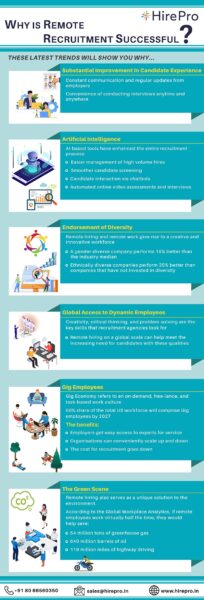
Ride the Remote Recruitment Wave to Pick the Best from the Global Pool
The art and science of recruitment has evolved significantly since its infancy during the 2nd World War. In the 1940s, the recruiter scrambled to find workers to meet local requirements, as the lion’s share of able-bodied men were being drafted for the great war. Being a highly adaptable species, recruiting agencies segued into representing and finding jobs for the masses of trained men who flooded the streets after the war. Over the years, as the world went through the four industrial revolutions, the recruitment industry moulded and aligned itself to the changing environment. This business has now grown so widespread that it would be difficult to find a business or job seeker who has not had a touch point with a recruitment agency. So, it is not surprising that the global recruitment outsourcing market is expected to reach $14.5 billion by 2026*.

In the beginning, companies limited their recruitment to the locality in which they were based. Till the 1980s, recruiters primarily depended on newspaper ads and word-of-mouth publicity to source candidates. In the new millennium, job portals and online ads became popular recruitment tools.
Today, robust communication technologies and clear actionables have lifted the physical barriers between employers and a quality workforce. Digitization is the new magic word. Companies that had shelved many healthy ideas due to non-availability of desirable talent are now on the remote work bandwagon. This is witnessed in the increase in popularity of remote hiring over the years. According to the US Census Bureau, 3.3% of its working population worked remotely in 2000. The share of remote workers increased to 5.2%, in 2017. A recent survey by SIEPR projects that 42% of employees in the US work remotely. While this unprecedented increase in remote work can be largely attributed to the pandemic, we believe that this trend is here to stay.
Here’s a look at some of the recent recruitment trends that point to why you should adopt remote hiring.
- Candidate Experience is in the Driver’s Seat
According to Deloitte, 83% of talent said that a negative interview experience could bring about a change in mindset about a job or employer brand that they wanted to be associated with. It is interesting to note that an almost similar percentage of talent said that a positive experience could trigger a change in mindset about a job they were doubtful about. That is the power of the recruitment experience. In today’s recruitment scenario, the employer is being reviewed and interviewed as much as the candidate. A company that has invested in the remote hiring model is in a better position to build persuasive candidate experiences. - Artificial Intelligence
AI and HR might seem like chalk and cheese, but the use of AI and its associated tools has streamlined and improved the entire recruitment process. The increase in hiring volume would have impacted many a recruiter adversely, if not for AI. With AI, it is possible to screen candidates based on specific requirements, interact with candidates via chatbots, and assess candidate responses during video interviews. AI can also be used to create personalized job recommendations, automated communications, and custom experiences for the candidate. AI tools ease companies’ transition to remote hiring. - Diversity, the Superhero
According to the Center for American Progress, diversity fosters a more creative and innovative workforce. Diversity is also a key aspect of entrepreneurialism. A gender-diverse company performs 15% better than the industry median. Ethnically diverse companies perform 35% better than companies that have not invested in diversity**. Remote hiring breaks down geographical barriers, providing access to a wider talent pool. A flexible and remote work culture encourages women and differently-abled individuals to join the workforce, fostering diversity in companies that hire them.
- The Multifaceted Employee
The World Economic Forum predicts that 35% of the skills considered essential today, will change in the next five years. Companies will be on the lookout for candidates with the adaptability and flexibility to navigate this dynamic environment. They will also look for skills such as creativity, critical thinking, and problem-solving while screening candidates. The demand for candidates with skills such as active listening, negotiating, and quality control are also going up. Organizations will increasingly want to hire from the large global talent pool to find candidates with these qualities. - People Analytics
Recent studies by Deloitte indicate that empathy and focus on the human capital are essential to an organisation’s resilience. People analytics uses formal scientific methods to support empathy. This is a relatively new field that is set to trigger powerful innovations in the near future.
Gig: The New Big
A decade ago, musicians and artists referred to their next performance as a “Gig”. Now Gig Economy refers to an on-demand, freelance, and task-based work culture. A recent Forbes article pegged the size of this new way of working at 50 million people. In fact, 50% share of the total US workforce would comprise Gig employees by 2027.
Apart from the flexibility and freedom, it allows the employees, this style of work benefits the employer too. Here are some of the benefits enjoyed by the employer.
- Easy access to experts for services that they do not need on a regular basis.
- Increased scalability. An organisation can easily scale up and down with this model.
- Less investment in healthcare and other benefits
Brian Kropp, Vice President, Gartner, says, “Our research finds that 32% of organizations are replacing full-time employees with contingent workers as a cost-saving measure. While gig workers offer employers greater workforce management flexibility, HR leaders will need to evaluate how performance management systems apply to these workers and determine whether they will be eligible for the same benefits as their full-time peers.”
Be Local, Hire Global
Hiring globally sitting in your office in one corner of the world would have been an uphill task a decade ago. Ask those oil companies that had to build rigs around the world and had to set up administrative offices in each of those locations. However, now that you are armed with the tools of remote recruitment, the world is your oyster. Once you unravel the complexities of local laws and regulations, you can have your workforce working from anywhere in the world without having to relocate them. This is a huge advantage for any organisation that wants to hire the best talent from across the globe.
Benefits of Remote Work Environment
Higher Productivity
If you are able to curb micromanaging and unnecessary team meetings to get “on the same page”, remote workers can be very productive. According to Forbes, employees working remotely are 30-40% more productive than their office counterparts. In fact, the flexibility offered by remote work results in lower absenteeism. This, in turn, fosters higher productivity.
Cost Effectiveness
A remote work environment allows you the obvious benefit of having to invest in less office space. Some remote work arrangements even allow for employees to work with their own equipment. Remote working arrangements would also allow you to negotiate slightly lower pay scales. This enables you to be more cost effective without compromising on the quality of your hire.
Better Employee Retention
According to Deloitte’s 2017 Millennial Survey, there is a strong relationship between flexible working environments and employee retention. According to the Predictive Index, remote workers are 13% more likely to stay than onsite workers.
Wider Talent Pool
Remote hiring brings you the opportunity to access and evaluate talent from a wider pool. You can now hire specialists and experts who otherwise may not have considered working at your company due to various reasons such as family obligations, expenses, and lifestyle changes. Also, remote work effectively removes the boundaries of distance, thus opening up opportunities to a wider populace.
The Green Solution
Did you know that hiring remotely could be your unique contribution to the environment?
Global Workplace Analytics states that if employees in a remote-friendly job decided to work virtually half the time, they would help save:
- 54 million tons of greenhouse gas
- 640 million barrels of oil
- 119 million miles of highway driving
In spite of all these advantages, remote hiring has its own set of drawbacks. It is difficult to build a feeling of community and team spirit within a team of remote workers. Organisations would need to find unique ways to fill this gap. Organizations that want to introduce remote work would need to restructure their processes so that communication does not fall by the wayside. Leadership and management would need to put in extra effort to remain visible to employees and ensure that remote workers feel that they have equal visibility as their onsite counterparts.
Once you’ve made the decision to hire remotely you would need to ensure that your HR practices are aligned to make this work optimally and smoothly. Remember that technology is the cornerstone of any remote hiring process. There are a variety of tools and services out there that you can equip yourself with to hire the best talent from the global pool. Online recruitment tools such as Applicant Tracking Systems, Recruitment CRMs, Skill Testing Tools, Psychometric Tools, Video Interview Platforms, Candidate Satisfaction Surveys, Background Check Tools, Reference Check Tools, and Onboarding tools allow you to streamline the entire recruitment process. At HirePro, we specialise in various aspects of virtual recruitment and amalgamate people analytics with the best candidate experience.

